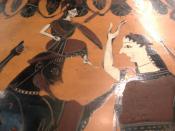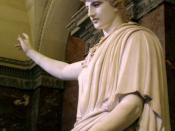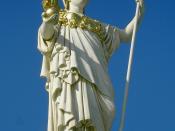Divine intervention is a feature of ancient Greek literature. One is amazed and even dumbfounded by the magical myths so frequently referred to. In Greek literature, the gods play an immense role in the lives and fates of the mortal dwellers of the earth. As one examines the gods throughout the myths and epic poems of the Greeks, one recieves a strong impression that the gods "play" with and manipulate mortals and each other. One goddess who exemplifies this is the great goddess Athena. This daughter of Zeus impacted everyone that she came across. The character Athena is "splashed" over Greek works. However, there are specific pieces of Greek literature that tell a great deal about this fiery goddess. This is not a passive goddess. This is an active, involved goddess who, in both the Iliad and the Odyssey, assumes divine leadership and challenges even Zeus himself. In The Odyssey and other Greek myths, Athena is an essential character and contributes many elements of her complex mythological personality to Greek writing.
Athena is one of the most important goddesses in Greek mythology. In Roman mythology she became identified with the goddess Minerva. Also known as Pallas Athena. Athena sprang full-grown and armored from the forehead of the god Zeus and was his favorite child. He entrusted her with his shield, adorned with the hideous head of Medusa the Gorgon, his buckler, and his principal weapon, the thunderbolt. A virgin goddess, she was called Parthenos ("the maiden"). Her major temple, the Parthenon, was in Athens, which, according to legend, became hers as a result of her gift of the olive tree to the Athenian people. Athena was primarily the goddess of the Greek cities, of industry and the arts, and, in later mythology, of wisdom; she was also goddess of...


